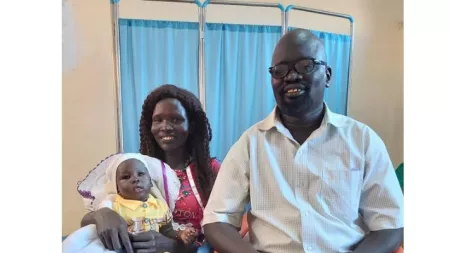As 37-year-old Rebecca Nyayuol arrived at Pariang hospital in February 2021 she was filled with anxiety. She was 3 months pregnant, and although she looked healthy and well Rebecca had already gone through the traumatic experience of losing, not just one, but 5 babies to miscarriages already.
“Before coming to Pariang Hospital, I had lost five pregnancies at five months. During my fifth month, I used to feel pain in the back before losing the baby. I really felt bad. Even with my current baby whenever I felt the pain, I thought I would lose the baby, but I continued with the pregnancy happily.”, says Rebecca.
But unlike her previous pregnancies, this time Rebecca was able to receive the vital ante-natal support she needed at a CARE-supported health facility. During her Antenatal visits a scan was done showing Rebecca had a serious cervical weakness and needed a simple but critical surgical procedure known as cervical cerclage, or a cervical stitch to fix it. Luckily this was able to be performed by head surgeon Dr Mike Benjamin at Pariang hospital and, 5 months later, thanks to regular follow ups and monitoring, Rebecca gave birth to a healthy baby boy. There is a well-known proverb: ‘a stitch in time saves nine ‘which means ‘sorting out a problem immediately may save a lot of extra work later. In Rebecca’s case, this could not have been more accurate; a simple stitch saved the life of her unborn child and ended years of traumatic miscarriages.
“After delivering my baby I was the happiest, everybody at home was filled with joy including my husband. My baby is well and healthy, thanks to Dr. Mike, the hospital team and CARE,” says Rebecca.
South Sudan has one of the weakest health systems, especially in terms of access to sexual and reproductive health services. Access to maternal and neonatal health services remains challenging, with around 70% of the population living at least 5 kilometers or more away from health facilities. The country has the highest maternal mortality rates of 789 per 100,000 live births, and neonatal and under-five mortality rates of 39.3 and 99.2, per 1000 live births respectively.
Despite the huge challenges CARE with support from partners is delivering lifesaving health care services to some of the country’s most remote communities. Since 2021, CARE’s Health and Nutrition programming in South Sudan has reached over 1.2 million people across the country. In Ruweng Administrative Area, CARE supports 7 health facilities across Pariang and Yida Counties on the Sudan – South Sudan border to ensure refugees and the host community at the nearby camps and settlements have access to health services. The hospital serves as a referral center providing specialized medical support including surgical and obstetrical operations, as well as a full package of reproductive health services such as antenatal care, antiretrovirals, Prevention of Mother to Child Transmission of HIV, deliveries, and family planning services.
